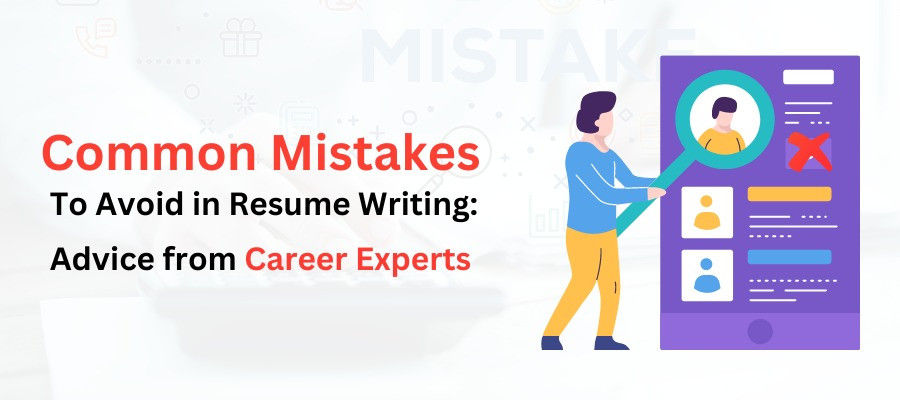Common Mistakes to Avoid in Resume Writing: Advice from Career Experts

When it comes to crafting the perfect resume, it's important to remember that quality trumps quantity. A resume should be tailored to the job you're applying for, showcase your best skills and experiences, and be used as an opportunity to demonstrate why you are the ideal candidate. Unfortunately, it's easy to make mistakes that can cost you the job. To help you avoid any missteps in resume writing, here are some of the most common errors, according to expert career advisors.
1. Writing a Generic Resume
Tailoring your resume to the job you're applying for is important. Blanket statements about your skills and experiences are not helpful for employers. They don't get a feel for what you can bring and its relevance to the job. Instead of writing generic statements, use specific examples and include relevant keywords from the job description to show you're the best candidate.
2. Not Highlighting Your Achievements
You may show how effective you were in previous jobs by highlighting your accomplishments on your resume. The key is to emphasize your successes rather than just listing your completed tasks. Rather than just listing your duties, highlighting your accomplishments and your positive influence on the company can give your CV more impact. You may provide more detail by saying that you improved customer satisfaction by 30% while managing the customer service team instead of just stating, "Managed customer service team." The more information prospective employers have about you, the better.
3. Not Including Keywords
Many employers use applicant tracking systems (ATS) to scan resumes for keywords that match the job description. Ensure to include relevant keywords in your resume to increase the chances of it being seen by potential employers.
4. Spelling errors and bad grammar
Ensuring that your resume has no typos or bad grammar is essential, as these can severely damage your credibility. Before submitting your resume, check it carefully, and it is a good idea to ask someone else to read it, too, for a second opinion. Double-checking your writing can help to catch any mistakes you may have missed and help you to present yourself in a more professional light. Taking the time to ensure that your resume is perfect will ensure you make the best impression possible.
5. Exaggerating the truth
It is essential to be truthful when crafting your resume. Many employers will contact your previous employers to verify the details you have included. Exaggerating information on your resume is dangerous and can negatively affect your career. Not only is it dishonest, but it can also result in dire consequences. Honesty is always the best policy regarding resumes and job applications. Make sure you provide accurate information and avoid embellishing your experience. Doing so will benefit you in the long run.
6. Poor formatting
Poorly formatted CVs are very unappealing to employers. If a CV has not been formatted correctly, it gives the impression that the individual lacks attention to detail and does not put in the effort required. It is important to remember that a CV essentially represents you on paper and, thus, should be as perfect as possible. Take the time to ensure the layout looks professional, neat, and easy to read. This will give a great first impression and help to portray you in the best possible light.
7. Lengthy CV
Writing a lengthy CV can be a real turn-off for employers. After all, reading such a document takes time and effort, and often the most important details can be lost in the abundance of words. Crafting a concise, targeted CV is essential to make a good impression. Remember, a CV is a marketing tool designed to showcase your skills and experience to a potential employer.
Keeping it brief and to the point is the best way to ensure they don't lose interest. A CV should be at least two pages and focus on the most important information. Don't overload employers with too much information, as this can often have the opposite effect. Your CV should be tailored to the job you are applying for and accurately reflect your abilities and experience. Keep it concise and informative, and you'll have a better chance of making that all-important good impression.
8. Not Including a Cover Letter
Including a cover letter with your resume is a great approach to getting the hiring manager's attention and showing them how passionate you are about the position for which you are applying. It lets you elaborate on your talents and expertise and explain why you would fit the role well. Cover letters, when attached to resumes, help applicants stand out and show that they put extra effort into their application materials. If you include a well-written, role-specific cover letter with your CV, hiring managers are likely to thoroughly review it.
Crafting a perfect resume takes time and effort, but it's an important part of the job application process. By avoiding these common mistakes, you can ensure that your resume stands out from the competition and increase your chances of landing the job of your dreams.
Reference Links:
https://www.monster.com/career-advice/article/avoid-the-top-10-resume-mistakes
https://www.topuniversities.com/student-info/careers-advice/11-common-cv-mistakes-according-employers



